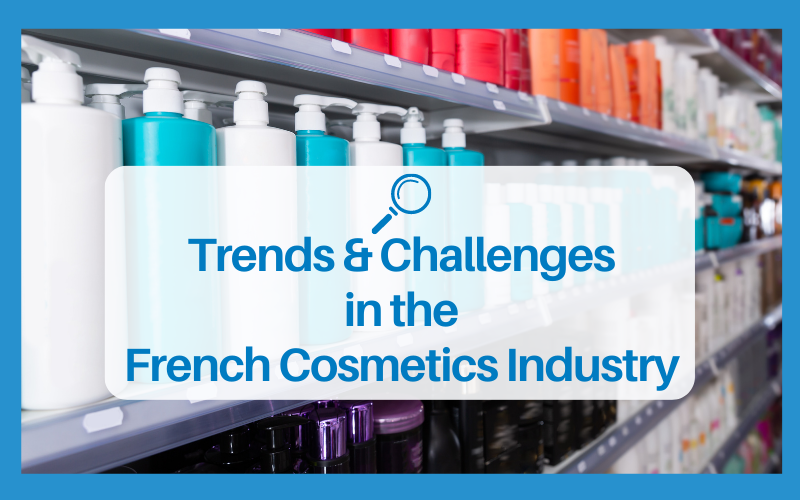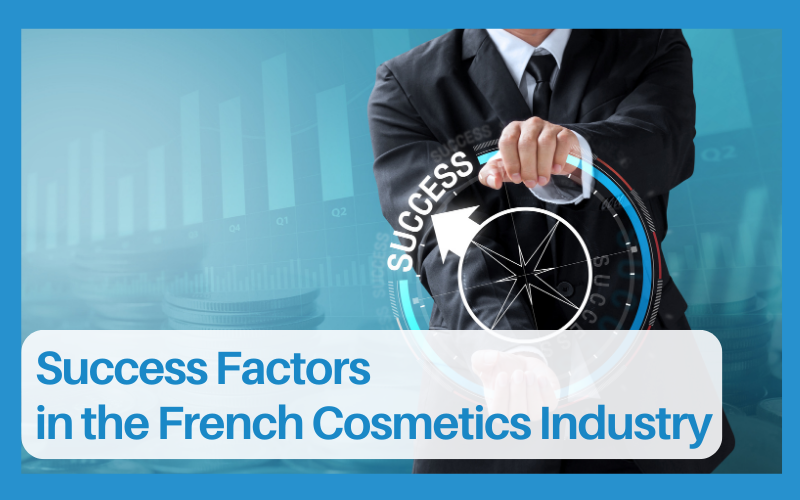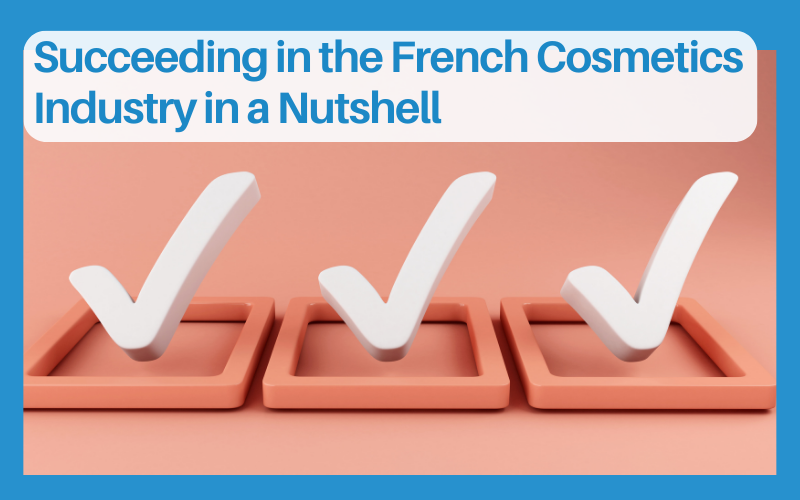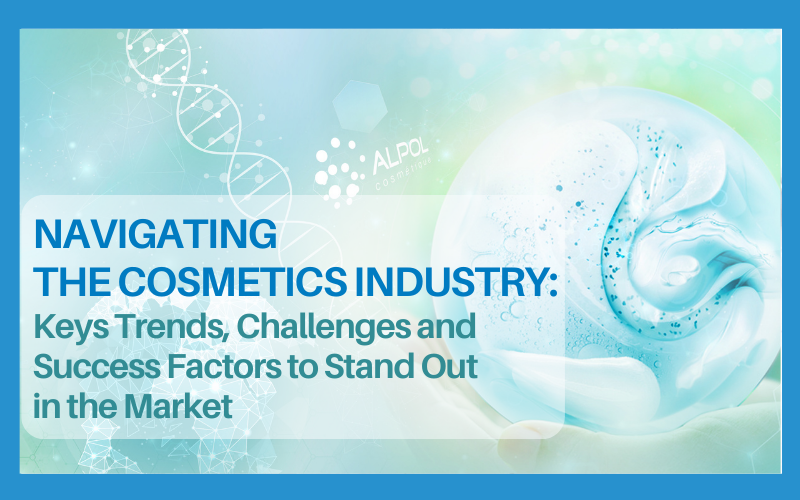The State of the Cosmetics Industry
The cosmetics industry is undergoing big changes, and beauty professionals must navigate a rapidly evolving commercial landscape. Cosmetic brands and manufacturers must meet stringent regulatory requirements while facing increased competition and meeting consumers’ demands for more sustainable and environmentally-friendly products.
In 2021, the global cosmetic and beauty industry reached record-high sales revenues. The United States of America recorded over $85 billion in revenue, while China emerged as the second-largest global market, displaying an impressive annual average growth rate of 12%, covering all market segments (skincare, haircare, make up, fragrances).
Industry players must address various challenges, including compliance with strict cosmetic regulations and meeting consumers’ evolving demands for natural, environmentally-friendly, and even personalized products, without compromising efficacy.

Trends and Challenges in the French Cosmetics Industry
The French cosmetics industry is one of the world’s largest and experiences consistent growth, fueled by a strong international presence. With a dynamic and innovative ecosystem, the French cosmetics market holds a leading position globally, “benefiting from advanced expertise and notoriety”, according to Christophe Masson, Competitive Pole Director at Cosmetic Valley. However, it also faces significant challenges that require constant adaptation to remain competitive.
Current trends in the French Cosmetics Industry
-
Natural and Sustainable Products
Consumers are increasingly aware of the environmental impact of cosmetic products. They seek more sustainable and planet-friendly beauty alternatives. As a result, organic and natural cosmetics are gaining traction. Brands offering natural ingredients and eco-friendly packaging experience growth, with consumers willing to pay a premium for such care products.
-
Product Customization
Consumers want skin care and beauty products that cater to their specific needs. Cosmetic brands are increasingly offering customization options to meet this growing demand. Technological advancements enable the creation of personalized products using data such as age, skin type, and personal preferences. These digital technologies provide consumers with a unique, immersive experience. It is smart beauty.
-
Rise of Independent Brands
Independent cosmetic brands have experienced rapid growth in recent years. Many of these brands emphasize ethical and responsible values. Some of them focus on promoting inner and outer well-being, positioning themselves in the holistic beauty trend. They differentiate themselves from traditional major brands by offering a comprehensive beauty experience known as “in-and-out” beauty.
Another identified trend among independent brands is their product range promoting inclusivity. Consumers seek brands that celebrate diversity and inclusion. Some beauty brands capitalize on this trend by offering cosmetics suitable for all skin types and tones.
In addition, digital-native independent cosmetic companies who strongly use social media as a growth engine tend to focus on customer experience to stand out.
Current Challenges in the French Cosmetics Industry
-
Cosmetic Regulation
The cosmetics industry is subject to strict regulations and standards regarding product safety and quality. Although these regulations may vary between countries, such as the impact of the evolving cosmetic regulation in China known as CSAR, cosmetic brands must be able to comply with these regulations in order to market their products.
In France, cosmetic regulations comply with the European Regulation No. 1223/2009, which defines safety and quality requirements for cosmetic products. Compliance with these regulations is crucial for the protection of consumer health and to ensure quality of products on the cosmetic market. Manufacturers must adhere to formulation conditions, including compositions and information requirements, for all products placed on the market.
Additional standards and laws have emerged alongside existing regulations. Cosmetic manufacturers must now rely on:
- ISO 16128 standard to determine if their products can be qualified as “natural.”
- The 49th amendment of the International Fragrance Association (IFRA) to limit the use of some allergenic substances in products.
- The AGEC (Anti-Waste for a Circular Economy) law, adopted in 2020, to reduce waste and promote eco-design of products.
Cosmetic regulatory affairs are therefore a key element in the cosmetics industry. They ensure the compliance of products and their packaging with regulatory requirements.
-
Increased Competition
According to Premium Beauty News, “despite increased competition, the French cosmetic market benefits from a strong ecosystem” where established major brands have significant marketing budgets, enabling them to maintain a strong market presence. Meanwhile, independent brands must exert extra efforts to differentiate themselves and offer innovative, high-quality products.
-
Consumer Pressure
Consumers have become more and more demanding, focusing on environmentally-friendly, ethical, innovative, and high-quality products. Beauty brands have to offer products that respond to consumers’ high expectations and focus on customer experience. Let’s look at consumers main demands:
- Transparency: Consumers expect brands to be transparent about the care product’s composition (safe cosmetic preservatives, active ingredients, etc.) and manufacturing processes of their products. Providing clear and detailed information about cosmetic products has become a major developmental challenge.
- Online reputation: Social media has greatly influenced the growth of the cosmetic market, partly due to the influence of online personalities, known as influencers. Consumers now seek online reviews and comments before purchasing cosmetic products. Maintaining a positive online reputation poses a significant challenge for brands.
- Millennials and Gen Z: These generations, born between 1980 and 2005, have a constant online presence, particularly Gen Z (born from 1998 onwards). They are the primary consumers of technological innovations in the cosmetics field and represent a promising target for the beauty science industry.

Key Players in the Cosmetics Industry
The cosmetics industry is a complex sector that relies on numerous players to drive its growth. Beauty brands must collaborate with various stakeholders, including R&D and analysis laboratories, cosmetics manufacturers or private label providers, raw material suppliers, distributors, and regulatory bodies, to ensure innovation, quality, reliability, safety, and compliance of their products.
Role of Key Players in the Cosmetics Industry
-
Cosmetic Brands
Brands play a central role in shaping consumers’ perception of beauty products and the cosmetics industry overall. They offer products that meet consumers’ needs and expectations. Often, brands act as the Responsible Person, fully responsible for placing their cosmetic products on the European market and complying with associated regulatory obligations.
-
R&D Laboratories
Whether integrated within cosmetic brands or as independent dermatological cosmetic laboratories, Research and Development is a key element for market innovation. R&D laboratories enable the design of new formulas, testing their efficacy, and integrating them into new cosmetic finished products.
-
Private Label Cosmetic Manufacturers
These manufacturers are essential players in the cosmetics industry. Cosmetic manufacturers, often referred to as private label providers, offer comprehensive solutions, including industrial transposition, to beauty brands. They support their clients throughout the product development process, from formulation creation to market release, encompassing cosmetic manufacturing. Typically, cosmetic manufacturers possess advanced production facilities, expert knowledge of applicable regulations and quality standards, and high proficiency in cosmetic product formulation.Brands can outsource their manufacturing processes to these private label providers, allowing them to focus on marketing and distribution. They serve as an ideal alternative for beauty brands seeking to create high-quality products without the costs and risks associated with establishing and operating their own R&D laboratories. They are a crucial player in this dynamic industry.
-
Raw Material Suppliers
To create their formulations, R&D laboratories rely on suppliers of raw materials, such as active ingredients and components.
-
Distributors
Cosmetic brands require distribution channels to make their products available to consumers. Whether online or physical stores (e.g., drugstores, retail chains, perfumeries, etc.), distributors enable brands to reach a wide audience and expand their customer base.They are responsible for getting cosmetic products from manufacturers to retailers and ultimately to consumers. They manage the logistic and distribution networks, ensuring that products are available in the right locations and reaching the intended target market.
-
Analysis Laboratories and Testing Service Providers
These entities offer in-depth analysis services and toxicological or efficacy testing to help brands evaluate the reliability of their formulas and ensure the quality and safety of their products. However, these cosmetic structures can be costly.
-
Regulatory Bodies
The cosmetics industry is heavily regulated, particularly regarding product safety and quality to protect consumer safety and regulate the industry. Regulatory bodies play a crucial role and can be of different forms acting as:
- Legislators to establish industry standards and norms.
- Regulatory affairs services implemented within cosmetic manufacturers to ensure compliance of their products with cosmetic regulations.
- A provider to ensure the quality of the Responsible Person in the market release process.
Brands must work closely with regulators to ensure the compliance of their products. In the case of outsourcing to a cosmetic manufacturer, the latt typically ensures product compliance and reliability.

Success Factors in the French Cosmetics Industry
To succeed in the French cosmetic market, several critical factors must be met. Let’s explore four essential elements:
-
Invest in Research and Development
To meet the French consumers’ high expectations, closely tied to current cosmetic trends, brands ought to invest in R&D. From holistic beauty movements to organic and natural cosmetics and beauty science, brands that invest in R&D can offer innovative, cutting-edge products, whilst complying with cosmetic regulations and prevailing standards.
-
Be Transparent with the Consumer Community
Transparency in formulation and manufacturing processes has become a critical aspect for cosmetic brands. Consumers seek products with clearly defined compositions and production methods. By providing detailed and accurate information about the ingredients and components used in the purchased cosmetic products, brands are more likely to establish a relationship of trust with their customers.
-
Act Virtuously and Responsibly
Consumers’ growth in consciousness about environmental impact has become one of the major driving factors for the use of organic and natural cosmetics. Brands must adapt and create cleaner, more eco-friendly alternatives in their production processes, chemical formulations, and finished product packaging.
-
Promote French Know-How
French brands have a valuable advantage in terms of cosmetic expertise and know-how. Promoting the “Made in France” aspect of their products helps brands showcase their heritage and traditional French cosmetic expertise. This is a significant asset for differentiation in both French and international markets.

Succeeding in the French Cosmetics Industry in a Nutshell
The French cosmetics industry faces numerous challenges and market trends that impact its development and competitiveness. To differentiate themselves and succeed in this highly competitive market, brands need to:
- Listen to specific consumer needs to drive innovation and offer tailored high-quality products that align with market trends.
- Commit to greater transparency in formulation and manufacturing processes.
- Act sustainably and virtuously in product development and production processes.
- Promote traditional French cosmetic expertise
- Collaborate with dedicated partners, such as private label cosmetic manufacturers, to focus on core competencies while benefiting from manufacturers’ regulatory expertise, R&D laboratories, and production capacities.
By focusing on these elements, brands gain a competitive advantage in the market and establish enduring brand images that withstand competition. Successful brands in the French cosmetics industry are those that create superior-quality products while remaining creative and innovative.
If you would like further information on cosmetic market trends or require assistance in creating your cosmetics product line, French cosmetic private label ALPOL Cosmetique can help you create the cosmetics of tomorrow. Get in touch with the teams here.





